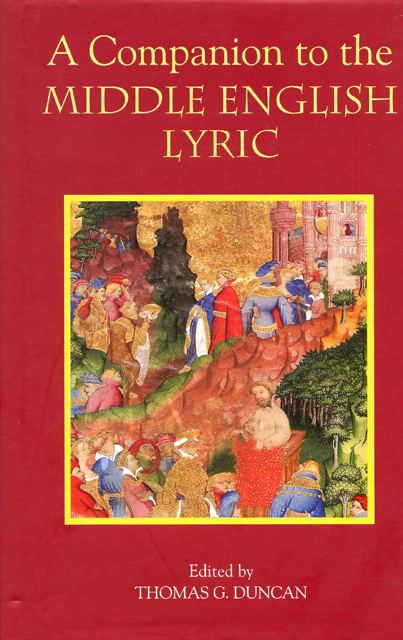Book contents
- Frontmatter
- Contents
- Acknowledgements
- Abbreviations
- Editorial Note
- Introduction
- 1 Middle English Lyrics and Manuscripts
- 2 Middle English Lyrics: Metre and Editorial Practice
- 3 The Love Lyric before Chaucer
- 4 Moral and Penitential Lyrics
- 5 Middle English Religious Lyrics
- 6 Middle English Courtly Lyrics: Chaucer to Henry VIII
- 7 The Middle English Carol
- 8 Political Lyrics
- 9 The Lyric in the Sermon
- 10 ‘Cuius Contrarium’: Middle English Popular Lyrics
- 11 Gender and Voice in Middle English Religious Lyrics
- 12 Lyrics in Middle Scots
- Bibliography of works cited
- Index of Manuscripts Cited
- General Index
- Index of Lyrics
5 - Middle English Religious Lyrics
Published online by Cambridge University Press: 23 March 2023
- Frontmatter
- Contents
- Acknowledgements
- Abbreviations
- Editorial Note
- Introduction
- 1 Middle English Lyrics and Manuscripts
- 2 Middle English Lyrics: Metre and Editorial Practice
- 3 The Love Lyric before Chaucer
- 4 Moral and Penitential Lyrics
- 5 Middle English Religious Lyrics
- 6 Middle English Courtly Lyrics: Chaucer to Henry VIII
- 7 The Middle English Carol
- 8 Political Lyrics
- 9 The Lyric in the Sermon
- 10 ‘Cuius Contrarium’: Middle English Popular Lyrics
- 11 Gender and Voice in Middle English Religious Lyrics
- 12 Lyrics in Middle Scots
- Bibliography of works cited
- Index of Manuscripts Cited
- General Index
- Index of Lyrics
Summary
Middle English texts rarely, if ever, exhibit degrees of textual stability and closure similar to literary texts of later periods. Yet, even by this reckoning, the Middle English religious lyrics are a singularly heterogeneous brood. Exemplifying many kinds of composition, from close translation to so-called originality, and serving a vast spectrum of devotional purposes, from doctrinal exposition to quasi-ecstatic fervour, they are also notable for their disconcerting instability of form – appearing with or without music, with or without illustration, with differently ordered stanzas, or with differing numbers of stanzas, in varying manuscript contexts. It is sometimes said, perhaps in a bid to recover some semblance of generic unity, that the religious lyrics speak with a particular kind of voice – personal, sincere, involved, immediate. Nonetheless, even this needs to be qualified by the recognition of the many different rhetorical and performative stances this voice can assume, and of the diversity of its acts of speech: Christ's speech from the cross, Mary's sorrowing speech as pietà, the loving or self-reproachful address of the lyric ‘I’, speaking for all devout believers, to mention but a few. This chapter attempts to negotiate this heterogeneity, capturing major themes, offering paradigms for reading, and interrogating some received patterns of reading in the light of recent religious scholarship. However, since none of these issues can be addressed with assurance without a preliminary understanding of the origins of the lyrics, and of their varying functions and readerships, we shall begin our discussion by laying a few contextual foundations.
Studies in the provenance of the most major manuscript collections of lyrics prior to 1350 have demonstrated that the Franciscan order played a decisive role in the introduction and development of the vernacular religious lyric within England, up until the mid-fourteenth century. The reasons that dictated this involvement are readily apparent. Committed from their earliest foundation to pastoral outreach amongst the laity, and well-known for the lyrical cast of their spirituality (an ardent lyric writer himself, Francis envisaged his followers as evangelists who would ‘sing’ men into the kingdom of heaven), the Franciscans appear to have viewed the vernacular lyrics as effective evangelical tools, utilising them within sermons to win the hearts and excite the emotions of those whom they addressed, as well as envisaging them as spurs to more personal and private devotion.
- Type
- Chapter
- Information
- A Companion to the Middle English Lyric , pp. 96 - 119Publisher: Boydell & BrewerPrint publication year: 2005
- 3
- Cited by

